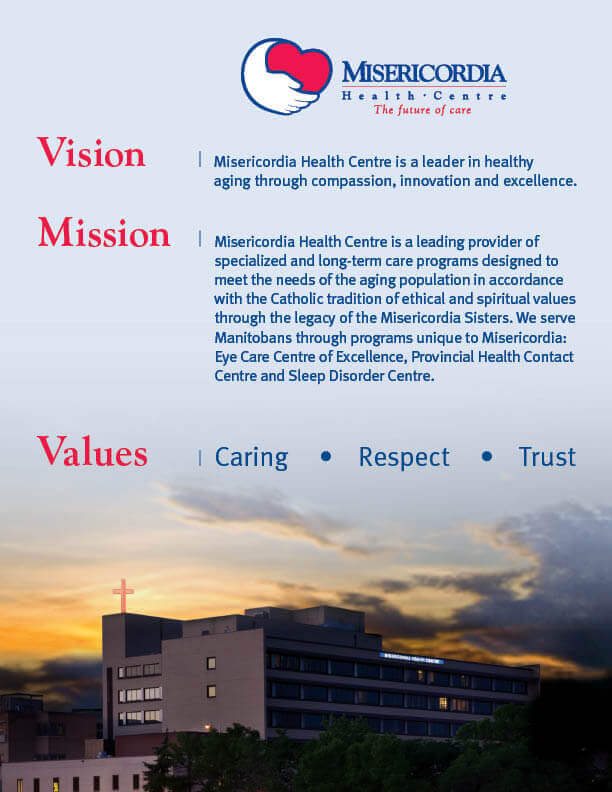Patient Safety
At Misericordia, we recognize that achieving and maintaining a culture of safety in our programs and services is essential for our patients, residents and clients. We are committed at all levels to fostering such a culture. One way we do this is by promptly recognizing and responding when something unexpected happens that causes, or could have caused, harm.
MHC actively promotes and participates in the reporting of patient safety events including Critical Incidents (CIs), in order to learn from them and improve our services. In 2013 MHC, in conjunction with the WRHA, implemented an electronic reporting and management system. Reporting, transparency, accountability and learning are essential elements in a safety culture.
We are committed to insure:
- Disclosure to patients and families affected by an event
- A thorough review of the events with a focus on potential system improvements
- Implementation of improvements
- Information sharing with patients and families, our staff and across the healthcare sector
Quality & Safety Improvements
MHC remains committed to the provision of safe care for all of our patients, residents and clients. A number of improvements have been made over the last few years to enhance the quality and safety of our services. These improvements include:
- Enhanced communication between our programs and ophthalmology physicians
- Better tracking of professional training for our nursing staff
- Projects at Misericordia Place to improve the collaboration of our services across professional disciplines
Participation in CPSI
Misericordia is an active participant in the Canadian Patient Safety Institute’s (CPSI) Safer Healthcare Now! and Shift to Safety! campaigns in collaboration with the Winnipeg Regional Health Authority. This has assisted us in the implementation of best practices to support patient safety improvements such as:
- Venous Thromboembolism (VTE) prophylaxis to prevent complications such as deep vein thrombosis (DVT) and pulmonary embolus
- Infection Prevention and Control measures to protect those who might be vulnerable from acquiring an infection – both in the general community and while receiving care
- Falls Prevention: Read about our award-winning Focus on Falls Prevention Project, including the Vision Screening Kit
- Medication management: We have been actively working with other programs and services in the region in the development and implementation of improved medication practices to insure our patients receive the right medication at the right time
Implementation of MIPS initiative
Misericordia implemented the Manitoba Institute for Patient Safety (MIPS) initiative, It’s Safe to Ask. We recognize the essential role patients and their families play in the care and treatment they receive, and so they are encouraged to ask a health-care professional these three questions while receiving healthcare services:
- What is my health problem?
- What do I need to do?
- Why do I need to do this?
We continue to promote this initiative through orientation and training, promotional material throughout facility and during our annual Patient Safety Week.
What is a Critical Incident (CI)?
A Critical Incident is an unintended event that occurs during the delivery of health services that results in serious harm, and that is not a result from underlying condition or a risk inherent in the provision of care and treatment.
Reporting a Critical Incident
If you believe a Critical Incident has occurred, please report it by calling the Winnipeg Regional Health Authority’s Critical Incident Reporting Line at 204-788-8222, available 24 hours per day, and 7 days per week. A trained counselor will guide you through a series of questions to gather information about the incident. A caller may choose to report anonymously.
Critical Incident Review Process
The goal of the review is to determine what occurred and why, and what changes can be made to prevent similar incidents from happening in the future. To encourage everyone to speak openly and frankly about what occurred, the Critical Incident review process is confidential.

